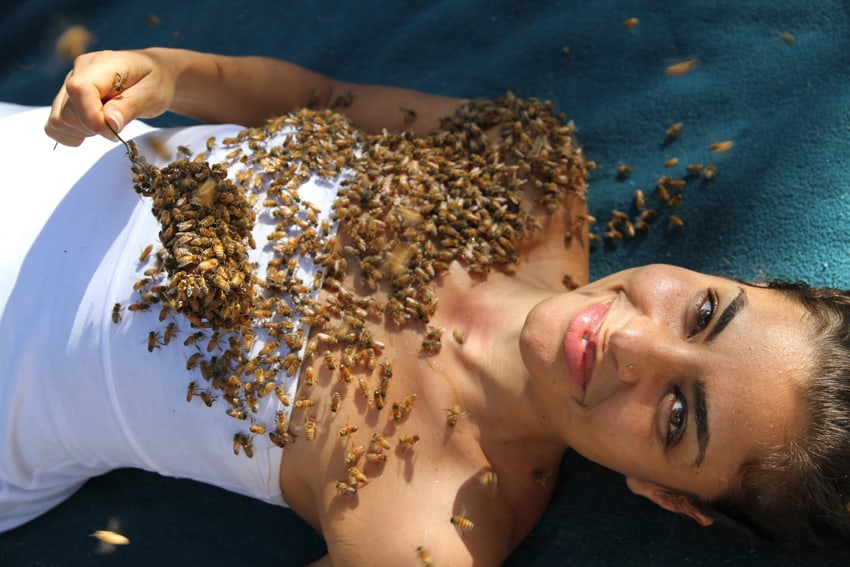Many people know that honeybees are vanishing. They bring this up in conversation in the tone of an urban legend: Have you heard about this honeybee thing? Something called “colony collapse disorder?” Apparently it might have to do with cellphones or something? Then the dialogue veers back to sports.
But Maryam Henein wanted to know more. Around 2006, the Canadian journalist was curious about this well-known but little understood fact. For five years, Henein collaborated with filmmaker George Landworthy to create “Vanishing of the Bees,” a feature documentary about this pandemic phenomenon. The film explores the reasons behind colony collapse disorder and its potentially catastrophic effects on ecology and agriculture around the world.
While the film was released in 2009, Henein recently spent about a month in Costa Rica, where she screened the film in unusual venues, including this year’s Envision Festival in Uvita, on the Pacific coast. Henein recently earned a certificate in permaculture, a journey that took her from Guatemala to Nicaragua and finally Costa Rica, and the documentary came along with her. She had the chance to collaborate with local groups like Association Community Carbon Trees and Costa Rica Meadery.
“The screenings had a big turnout,” said Henein during a recent talk with The Tico Times. “It was a positive response. Many people had not seen the movie. Even though it’s five years old, I tell people the movie is still alive because the bees are still dying.”
Raised in Montreal, Canada, Henein has experienced a personal renaissance in the past decade. In the early 2000s, she was working as a writer for various publications, including Penthouse. Rebelling against Montreal culture, which she found conservative, Henein penned a column for Penthouse called “The Unrepentant Voyeur.”
Then, one day in 2002, Henein was hit by a Ford Explorer while she was out walking. She was severely hurt in the accident and required physical therapy. Her medical experience was frustrating, she recalls, and she felt disenfranchised with Western medicine as a whole. Meanwhile, Henein had a revelation about her life and career: “I just wanted to do something with more substance.”
In the 13 years since, Henein has helped create several documentaries, each of which focuses on a critical social topic, such as the Exxon-Valdez oil spill. Through her film work Henein met Landworthy, a U.S. writer and filmmaker. Landworthy became interested in colony collapse, partly because of its cryptic origins.
“At the time, the gravity of the situation didn’t really hit me,” Henein remembered. “But George likes mysteries and radio plays. He was very much interested in the mystery aspect.”
But as Henein learned more about colony collapse, she seemed to have an almost mystical revelation. She says she drove through a swarm of bees in Los Angeles, where she now lives. She woke up one morning to find her bedroom window covered in bees. For Henein, bees have taken on a symbolic significance. “I consider bees a sister society,” she says. She sees a parallel between colony collapse and human abuse of the natural environment.
“Vanishing of the Bees” has become a labor of love, and a costly one at that. The two producers filmed more than 300 hours of footage, which was distilled into 87 minutes of screen time. They paid $100,000 to edit the U.K. version, then recut the U.S. version themselves. For narration, they briefly considered Scarlett Johansson. At one point she discussed the project with Leonardo DiCaprio, who was supportive.
Then there was another strange serendipity: While on the set of “Inception,” a crew member killed a bee that had flown into the studio. This upset the actress Ellen Page, who took the crew member to task. DiCaprio remembered the bee documentary and recommended Page to Henein and Landworthy. As it happened, Page was also raised in Canada and had studied permaculture. They hired Page, whose narration lent the film some celebrity cachet.
“I like to say that a honeybee sacrificed her life to bring us Ellen Page,” said Henein.
“Vanishing of the Bees” was screened at film festivals and received a limited theatrical release, and today the film is available on Netflix. But the documentary was not a blockbuster, and Henein is still paying back her investors.
Visiting Costa Rica gave Henein a chance to screen the film for a completely new audience and connect with local progressives and environmentalists. While honeybees are less vital to a tropical environment, and most of the bees in Costa Rica are Africanized – versus the more docile “Western” honeybee – the country still has its share of apiaries. As Henein notes, the impact of colony collapse disorder may be global.
“I’ve been trying to be a part of [Envision] for several years,” she said. “I had a good time. It’s a little bit too many people for me. But I like the fact that they’re mindful and they try to aim for a zero-waste event.”
Henein was scheduled to fly back to Los Angeles on April 1, where she manages her bee- and health-oriented startup company, “Honey Colony.” As for film work, she is interested in producing a documentary about dictators. Having spent so much money on “Vanishing of the Bees,” Henein plans to be more careful about her passion projects, but she remains proud of her film.
“I could see that this movie would have resonance,” she says. “It’s become my life’s work to educate people about the food supply. It’s a global crisis. I say this is a film for anyone who likes to eat.”






